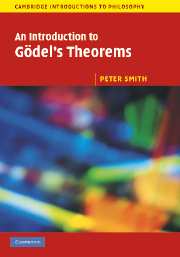Book contents
- Frontmatter
- Contents
- Preface
- 1 What Gödel's Theorems say
- 2 Decidability and enumerability
- 3 Axiomatized formal theories
- 4 Capturing numerical properties
- 5 The truths of arithmetic
- 6 Sufficiently strong arithmetics
- 7 Interlude: Taking stock
- 8 Two formalized arithmetics
- 9 What Q can prove
- 10 First-order Peano Arithmetic
- 11 Primitive recursive functions
- 12 Capturing p.r. functions
- 13 Q is p.r. adequate
- 14 Interlude: A very little about Principia
- 15 The arithmetization of syntax
- 16 PA is incomplete
- 17 Gödel's First Theorem
- 18 Interlude: About the First Theorem
- 19 Strengthening the First Theorem
- 20 The Diagonalization Lemma
- 21 Using the Diagonalization Lemma
- 22 Second-order arithmetics
- 23 Interlude: Incompleteness and Isaacson's conjecture
- 24 Gödel's Second Theorem for PA
- 25 The derivability conditions
- 26 Deriving the derivability conditions
- 27 Reflections
- 28 Interlude: About the Second Theorem
- 29 µ-Recursive functions
- 30 Undecidability and incompleteness
- 31 Turing machines
- 32 Turing machines and recursiveness
- 33 Halting problems
- 34 The Church–Turing Thesis
- 35 Proving the Thesis?
- 36 Looking back
- Further reading
- Bibliography
- Index
30 - Undecidability and incompleteness
Published online by Cambridge University Press: 05 June 2012
- Frontmatter
- Contents
- Preface
- 1 What Gödel's Theorems say
- 2 Decidability and enumerability
- 3 Axiomatized formal theories
- 4 Capturing numerical properties
- 5 The truths of arithmetic
- 6 Sufficiently strong arithmetics
- 7 Interlude: Taking stock
- 8 Two formalized arithmetics
- 9 What Q can prove
- 10 First-order Peano Arithmetic
- 11 Primitive recursive functions
- 12 Capturing p.r. functions
- 13 Q is p.r. adequate
- 14 Interlude: A very little about Principia
- 15 The arithmetization of syntax
- 16 PA is incomplete
- 17 Gödel's First Theorem
- 18 Interlude: About the First Theorem
- 19 Strengthening the First Theorem
- 20 The Diagonalization Lemma
- 21 Using the Diagonalization Lemma
- 22 Second-order arithmetics
- 23 Interlude: Incompleteness and Isaacson's conjecture
- 24 Gödel's Second Theorem for PA
- 25 The derivability conditions
- 26 Deriving the derivability conditions
- 27 Reflections
- 28 Interlude: About the Second Theorem
- 29 µ-Recursive functions
- 30 Undecidability and incompleteness
- 31 Turing machines
- 32 Turing machines and recursiveness
- 33 Halting problems
- 34 The Church–Turing Thesis
- 35 Proving the Thesis?
- 36 Looking back
- Further reading
- Bibliography
- Index
Summary
Theorem 13.6 tells us that Q can capture all p.r. functions. Our next theorem shows that Q can in fact capture all µ-recursive functions. With a bit of help from Church's Thesis, our new stronger theorem enables us very quickly to prove two new Big Results: first, any nice theory is undecidable; and second, theoremhood in first-order logic is undecidable too.
The old Theorem 13.6 is, of course, the key result which underlies incompleteness theorems like Theorem 17.2 (if T is nice and ω-consistent, then T is incomplete). Our new theorem correspondingly underlies some easy variations on that earlier incompleteness theorem and its relatives. We'll also prove a formal counterpart to the informal theorem of Chapter 6.
Q is recursively adequate
Recall that we said that a theory is p.r. adequate if it captures each p.r. function as a function (Section 12.4). Let's likewise say that
A theory is recursively adequate iff it captures each µ-recursive function as a function.
We showed that Q is p.r. adequate in Chapter 13. Overall that took some ingenuity; but given the work we've already done, it is now very easy to go on to establish
Theorem 30.1 Q is recursively adequate.
Proof Theorem 13.3 tells us that Q can capture any Σ1 function as a function. To establish that Q is recursively adequate, it therefore suffices to show that recursive functions are Σ1 (i.e. are expressible by Σ1 wffs).
- Type
- Chapter
- Information
- An Introduction to Gödel's Theorems , pp. 277 - 286Publisher: Cambridge University PressPrint publication year: 2007



